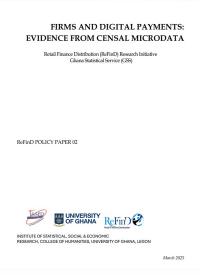Advancing digital payments for firms is an essential building block for business performance and financial inclusion. This report provides an in-depth analysis of digital financial services (DFS) adoption and usage among all firms in Ghana, utilizing data from the Integrated Business Establishment Census (IBES) 2024. The analysis covers 1.9 million firms across the country, focusing on the patterns of digital payments adoption and usage, the determinants of adoption and usage, and the barriers different firms face.
The findings emphasize the significant role that firm size, sector, formality, gender, and geographic factors play in shaping the adoption and usage of digital payment technologies. While personal mobile money accounts remain the commonest—even among larger firms—merchant accounts correlate with stronger business growth and formalization. Barriers, such as knowledge gaps, fraud concerns, and uncertainty about returns, hinder broader adoption and usage, particularly among informal, agricultural, and female-owned enterprises.
Female-owned businesses are smaller, less profitable, and less likely to be formalized or to adopt digital payments. However, in male-owned firms, female managers—especially when supported by female workers—drive revenue growth and digital financial adoption and usage. This effect is particularly evident among small, formal, and service-sector businesses.
- Log in to post comments


